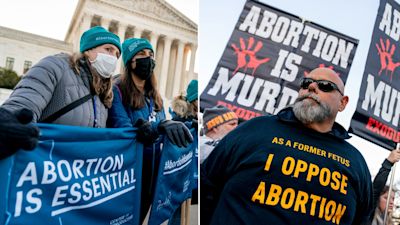Divided Americans protest outside Supreme Court in pivotal moment for US abortion law

ITV News Correspondent John Ray reports on one of America's greatest divides
In the biggest challenge to abortion rights in decades, the Supreme Court’s conservative majority on Wednesday signalled they would allow states to ban abortion much earlier in pregnancy and may even overturn the landmark 1973 Roe v Wade case that legalised abortion in the United States.
The Roe v Wade ruling established a nationwide right to abortion at any point before a foetus can survive outside the womb, generally around 24 weeks.
It was based on the decision that a woman's right to end her pregnancy came under the freedom of personal choice in family matters.
Hundreds of demonstrators stood outside the court chanting for and against, while the justices inside led arguments that could decide the fate of US abortion rights.
After nearly two hours of arguments, all six conservative justices, including three appointed by former President Donald Trump, indicated they would uphold a Mississippi law that bans abortion after 15 weeks of pregnancy.
The state in question is deep in the bible belt where Christian campaigners try to win over patients - with little success - arriving at Mississippi's last abortion clinic, and pray that America is moving towards a total ban. One of these anti-abortion campaigners, Gabriel Olivier, said: “All life is life, and all of it, every person, you myself and the unborn child are all created in the image of God.
"Why are we trying to determine how old the child has to be before we can kill it”.
Kayla Roberts was 15-years-old when she ended her first pregnancy
For many others who turned up outside the Supreme Court, however, the changes could undo the progress made in ensuring women have the right to make their own decisions on what happens with their bodies.
They argue banning abortions only bans safe abortions - forcing women to find often dangerous alternatives.
Mother Kayla Roberts was 15-years-old when she ended her first pregnancy, saying she was too young and too poor to cope with a child.
"You can see it’s human rights, women’s rights, and the people in the Supreme Court is mostly, to me, men - white men - telling females what to do with their bodies," she said.
Former US vice president Mike Pence called on the Supreme Court to overturn the Roe v Wade case, saying it was "a misguided decision" that harmed millions of unborn babies.
“We are asking the court in no uncertain terms to make history,” Mr Pence, who has been laying the groundwork for a presidential run in 2024, said during a speech in Washington.
He believes elected, state-level officials are better placed to write abortion laws for their own jurisdictions.
“We are asking the Supreme Court of the United States to overturn Roe v Wade and restore the sanctity of life at the center of American law,” Mr Pence added.
Why the focus on Mississippi?
The Mississippi ban, which includes abortions of pregnancies caused by rape or incest, has not been enforced because of a legal challenge from the state's only abortion provider.
A nationwide ban on abortions is not on the horizon, but a ruling in Mississippi's favour would mean that US states would be free to create their own abortion laws.
This could mean abortion could soon become illegal across many more states in the US, as 12 states have already passed 'trigger laws', which would automatically ban abortion if the Roe v Wade ruling was overruled.
The court could decide to uphold current precedent, let the law stand or overturn the Roe vs Wade decision entirely. The court’s decision is expected by late June.
The court is also considering challenges to a Texas law that bans abortions after six weeks- before many women even know they are pregnant.
The Texas legislation, which took effect on September 1, is the country's most extreme anti-abortion measure and has been branded "un-American" by President Joe Biden.
Abortion providers have tried and failed to get the law overturned at the Supreme Court.